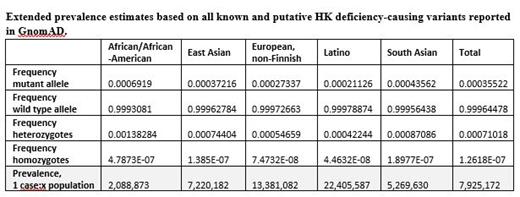Abstract
Background: Severe high molecular weight kininogen (HK) deficiency is an autosomal recessive defect of the contact system caused by mutations in KNG1. Limited scientific interest in HK deficiency due to the rarity of the seemingly asymptomatic condition may increase, as HK, the precursor of bradykinin, is now discussed as a therapeutic target e.g. in hereditary angioedema.
Aims: We provide a comprehensive analysis of the diagnostic, clinical, and genetic features of HK deficiency and estimate its frequency.
Methods: We identified a new case of HK deficiency, systematically review the literature, conduct new genetic studies of reported cases, and comprehensively analyze the clinical course and diagnostic criteria. Clotting activity of HK and prekallikrein (PK) (HK:C/PK:C) and antigen (HK:Ag/PK:Ag) were determined and genetic analyses of KNG1 and KLKB1 were performed by Sanger sequencing. Characteristics deduced from the known HK deficiency-causing variants were used to estimate the frequency of HK deficiency from the KNG1 variants aggregated in GnomAD.
Results: 677 studies were identified by systematic review of the literature for HK deficiency. 27 of these contained individual cases of HK deficiency including 6 studies not listed in PubMed. Little-noticed cases from the gray literature account for more than one-third (16/39) of the extracted, unrelated cases. We genotyped one newly diagnosed HK-deficient case and 2 cases described in the literature and additionally evaluated all 10 studies reporting genetic data in HK-deficiency (including one case previously misdiagnosed as having PK deficiency). A total of 10 KNG1 variants causing HK deficiency (one new) were found, the most frequent being c.586C>T, p.Arg196* (4 unrelated families). Interestingly, all HK deficiency-causing variants are truncating, whereas two amino acid substitutions with presumed functional consequence, have been described as the cause of hereditary angioedema. Conservative prevalence estimates based on all known and putative HK deficiency-causing variants extracted from GnomAD (truncating variants in KNG1, including indels, nonsense and canonical splice site mutations located in that part of the gene, where relevant mutations have been described) revealed a frequency of 1 case of HK deficiency among 7,925,172 with slight differences in the analyzed ethnicities (see table). In addition, although not to the same extent as seen in PK deficiency, HK deficiency apparently is more prevalent in Africans.
While it is already well known that HK deficiency causes decreased PK levels, our data indicate that factor XI levels are also frequently decreased, albeit to a lesser extent.
The number of cases detected so far is too low for a more detailed analysis regarding bleeding, thrombotic, and cardiovascular events or immunological abnormalities.
Conclusion: HK-deficiency is probably more frequent than previously thought. Suspected cases of contact phase defects should at least be analyzed for HK activity (besides factor XII, XI and PK activity) to facilitate conclusive evaluation of the clinical significance in the future.
Lämmle: Takeda: Membership on an entity's Board of Directors or advisory committees; Ablynx: Membership on an entity's Board of Directors or advisory committees, Other: Travel Support, Speakers Bureau; Baxter: Other: Travel Support, Speakers Bureau; Alexion: Other: Travel Support, Speakers Bureau; Siemens: Other: Travel Support, Speakers Bureau; Bayer: Other: Travel Support, Speakers Bureau; Roche: Other: Travel Support, Speakers Bureau; Sanofi: Other: Travel Support, Speakers Bureau.


This feature is available to Subscribers Only
Sign In or Create an Account Close Modal